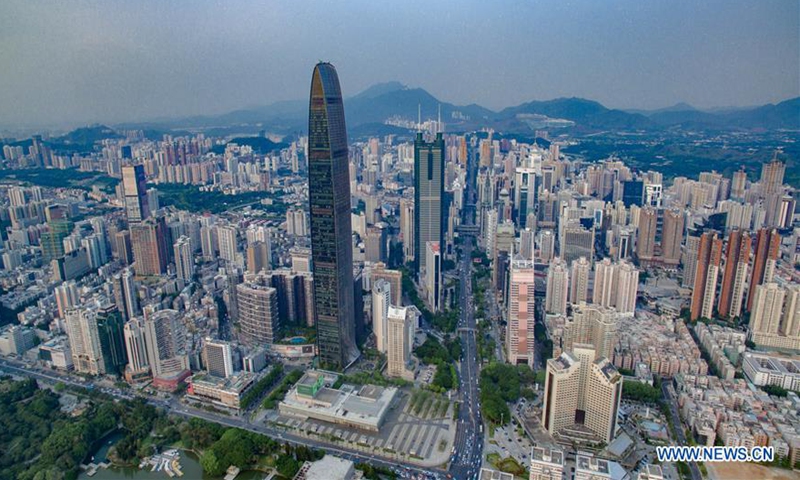Security review rules escort high-level opening-up; foreign capital enjoys rosy future in China
Source: Global Times Published: 2020/12/21 10:58:35

Aerial photo taken on May 23, 2018 shows the Luohu District of Shenzhen, south China's Guangdong Province. Known as a paragon of opening-up and development, Shenzhen in Guangdong Province is one of China's earliest special economic zones. Starting from a small town, it has developed into a key economic hub in the past 40 years. (Xinhua/Mao Siqian)
In accordance with China's long-standing opening-up policy, the country on Saturday unveiled new measures on the review of foreign investment affecting national security. While actively promoting and protecting foreign investment, the measures aim to effectively prevent and defuse national security risks to safeguard China's opening-up to a higher level.
Based on China's Foreign Investment Law and National Security Law, China's Ministry of Commerce and National Development and Reform Commission (NDRC) jointly announced the new rules to conduct security reviews on foreign investments that affect or may affect the country's national security. The measures which will come into effect from January 18, 2021, cover foreign investment in military-related areas, key resources, vital infrastructure and others.
China's issuing of security review measures is a step to integrate with international practices. Before China, major countries and regions in the world have successively introduced or improved their security review system for foreign investment, from the US to the EU, from Australia to Japan.
Instead of promoting protectionism or moving backwards on opening-up, the move aims to escort the high-quality and high-level opening-up of China. Without security assurance, the opening-up will not be sustainable. Only by shoring up the fence against security risks can China lay solid foundations for a new round of opening up that is broader, wider and deeper.
Despite the sudden onslaught of the deadly COVID-19 pandemic and years of unilateralism heated up by the Trump administration, China has been firmly upholding the opening-up as a basic state policy and continues to ramp up efforts to improve its business environment.
Being battered by the once-in-a-century health crisis, the global economy has been plunged into a time of dim prospects, with investment and trade falling sharply. By contrast, China, which has managed to get the virus under control through strict and effective containment measures as well as 1.4 billion people's collective efforts, has emerged as one of a handful of economies seeing growth in foreign direct investment (FDI) this year.
Global FDI fell 49 percent in the first half of 2020 compared to 2019, due to the economic fallout from COVID-19, revealed UNCTAD's report released in October.
Thanks to the rapid recovery of the country's economy, China has recorded actual use of foreign investment in the first three quarters at 718.8 billion yuan ($110 billion), up 5.2 percent year-on-year. A total of 26,367 new foreign-funded firms were set up across the country in the first nine months while the coronavirus kept ripping through the world.
The figure shows China's comprehensive competitiveness, including not only labor costs, but sound industrial facilities, scale economy, complete industrial chains and competitive technologies.
As the only major economy which expected to see growth this year, China is choreographing its next Five-Year Plan to make its economy even bigger and stronger by 2025. With foreign-funded firms deeply integrating into the Chinese economy for decades and contributing to the nation's development, a higher level opening-up of the country with managed risks will also benefit the growth of foreign capital in China.
Unlike certain developed economies, China will not stretch this national security concept to suppress foreign businesses. And with China unswervingly promoting its opening up and improving its business environment, the prospect of foreign investments in China will remain rosy in the future.
The article was compiled based on an interview with Bai Ming, deputy director of the Ministry of Commerce's International Market Research Institute. bizopinion@globaltimes.com.cn
Posted in: EXPERT ASSESSMENT